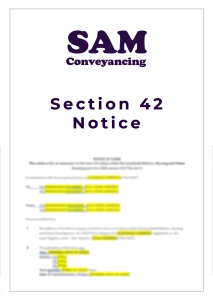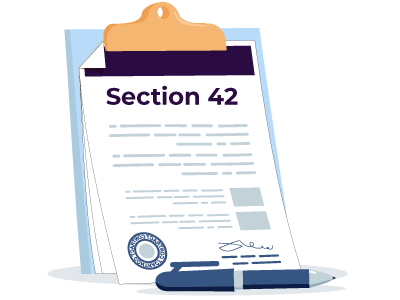What is a Section 42 Notice?
A Section 42 Notice, also known as a Tenant's Notice, is the formal document used by a qualifying leaseholder to claim their statutory right to extend their lease under the Leasehold Reform, Housing and Urban Development Act 1993.
Serving this notice officially starts the legal process with the landlord and sets the timeline for the claim. Before doing this, though, you need to check your eligibility and instruct a professional lease extension valuation.
Leaseholders can serve their own Section 42 Notice, however, most people instruct a solicitor to do it for them. A leaseholder can extend the lease themselves or they can assign the Section 42 Notice to a buyer, to allow them to extend the lease after the property has been sold.
Purpose and effect of serving a Section 42 Notice
Its primary purpose is to formally notify the landlord of the leaseholder's statutory right to extend the lease of their property and to initiate the formal statutory lease extension process.
Serving this notice is a critical first step, setting a strict legal timetable that both parties must adhere to. Landlords typically have two months to respond with a Counter Notice.
Mistakes in drafting or serving the notice can lead to your claim being deemed invalid or struck out, potentially resulting in a 12-month waiting period before you can make another claim, costing you time, effort, and money.
Before serving the notice, leaseholders should:
- Ensure they meet the eligibility criteria for a statutory lease extension.
- Obtain a professional valuation to understand the likely premium payable.
- Confirm they can afford the estimated premium and associated costs.
As a leaseholder, you can extend the lease yourself after serving the notice, or you can assign the benefit of the Section 42 notice to a buyer. This allows the buyer to complete the lease extension after the property has been sold, which can be particularly useful when selling a property with a short lease.
Download a leaseholder notice free from hassle that is legally binding(i) in England & Wales.
- Instant download in Word and PDF format.
- Suitable for extending your leasehold flat in England & Wales.
- Legally binding(i).
The templates will be attached to your confirmation email after payment. Please allow a couple of minutes for the email to arrive.

What the Section 42 Notice must contain
The Section 42 Notice is a prescribed form that must contain specific information as set out in the Leasehold Reform, Housing and Urban Development Act 1993. To be considered valid, the tenant's notice must:
- State the full name of the tenant(s) and the address of the flat to which the claim relates.
- Contain sufficient particulars of the flat to identify the property and details of the tenant’s lease, including the date it was entered into, the term granted, and the commencement date.
- Specify the premium the tenant proposes to pay for the new lease and details of any other amounts payable according to Schedule 13 of the Act.
- Specify the terms the tenant proposes should be contained in the new lease.
- State the name and address in England and Wales of the person (if any) appointed to act for the tenant in connection with his claim.
- Specify the date by which the landlord must respond by serving a Section 45 Counter Notice. This date must be not less than two months after the date the Section 42 Notice is given (commonly set as 2 months and 1 day later).
Serving the Section 42 Notice accurately
Once you have completed the necessary preparatory steps (checking eligibility, obtaining a valuation, confirming affordability), the next crucial stage is the formal serving of the Section 42 Notice on your landlord(s).
While the law permits leaseholders to serve their own Section 42 Notice, most people instruct a specialist solicitor to handle this for them. A conveyancing solicitor experienced in lease extensions is fully aware that an S42 Notice served on a landlord or freeholder must be completed and served with absolute accuracy.
If your landlord finds faults or inaccuracies in the notice, they have the right to apply to the court to have it dismissed.
If your application is dismissed due to errors in the notice, it means your current claim is stopped. Crucially, you will also be prevented from making another statutory claim for 12 months.
This results in wasted time, effort, and professional fees incurred, and your lease will continue to shorten during the waiting period, potentially increasing the premium next time you apply.
Landlord's Response: The Counter Notice
Once you, as the leaseholder, have served a valid Section 42 Notice, your landlord is legally obliged to respond by serving a Section 45 Counter Notice. This must be done within a strict statutory timeframe.
The landlord has exactly two months from the date they received your Section 42 Notice to serve their Counter Notice. If a landlord fails to serve a valid Counter Notice within this two-month period, they may be legally obliged to comply with the tenant's terms as set out in the original Section 42 Notice.
In their Section 45 Counter Notice, the landlord must state whether they admit or deny the leaseholder's right to a statutory lease extension. If the right is admitted, the landlord may:
- Accept the lease extension request and consent to the tenant’s proposed terms (including the premium).
- Accept the lease extension request but propose alternative terms (including a different premium they believe is payable).
A landlord cannot refuse the application simply because they do not want to grant the extension, unless the tenant does not qualify for statutory extension based on the legal eligibility criteria, or if they intend to redevelop the property (although the right to redevelop is being significantly restricted by the 2024 Act, where in force).
If the landlord rejects the claim, they must provide clear grounds based on statutory requirements or faults found in the Section 42 Notice. If the landlord accepts the right to an extension but rejects the tenant's proposed terms (usually the premium), they must serve a counteroffer.
Once a counteroffer is served, there is a statutory negotiation period. The parties have six months from the date the Counter Notice is served to negotiate and agree upon the new lease terms, particularly the premium and any disputed clauses.
If no agreement can be reached within this six-month period, either party may apply to the First-tier Tribunal (Property Chamber) to determine the terms in dispute.
The Leasehold and Freehold Reform Act 2024 was passed on the 24th May 2024, but is not fully enforced yet and the date for this is not yet clear. We will update our content as and when the finalised legislation is published.
Dealing with an Absent Freeholder
If your landlord or freeholder cannot be located or is unresponsive, you cannot follow the standard process. Instead, you must apply to the County Court for a Vesting Order to complete the extension.
Costs of a Statutory Lease Extension
Extending the lease of a property via the statutory process involves several costs beyond just the premium paid to the landlord. It is essential to budget for these when planning your lease extension claim, as they can run upwards of £9,000+.
The Premium
This is often the most expensive part of extending your lease and represents compensation to the landlord for granting the additional 90 years and reducing the ground rent to a peppercorn.
The estimated cost typically falls within a wide range, often starting from around £5,000 and potentially significantly higher depending on the property's value, location, and current lease length (especially if below 80 years).
Leaseholder's Valuation Fee
You will need to instruct a specialist surveyor to provide a valuation report assessing the premium you should offer in your Section 42 Notice and to negotiate with the landlord's surveyor.
Using a RICS-accredited independent surveyor is recommended. Our panel are RICS accredited and we offer lease extension valuation for £600 INC VAT.
Leaseholder's Solicitor Fees
You will need a specialist leasehold solicitor to handle the legal process, draft and serve the Section 42 Notice correctly, deal with the Counter Notice, negotiate lease terms, and complete the legal registration.
Compare quotes carefully and confirm the fee structure. Our fixed fee is £720 INC VAT, we can also help with the Section 42 Notice only for £600 INC VAT.
Landlord's Valuation Fee
You are currently legally required to pay the landlord's reasonable costs incurred in response to your claim, including their valuation fee.
This is only payable if they choose to get their own valuation (which is almost always the case if the premium is significant). They choose their own surveyor, so this cost can vary but should typically be from £600 to £900.
Landlord's Legal Costs
You are also responsible for the landlord's reasonable legal fees incurred in dealing with your claim, including reviewing the notice, serving the counter-notice, negotiating terms, and handling the legal completion of the new lease.
They choose their own solicitor, and this cost should typically be in the region of £600 - £1,200. We offer this service for landlords for £1,500 INC VAT.
Surveyor Negotiation Costs
If the initial premium offers are disputed, your surveyor will negotiate with the landlord's surveyor. Most surveyors charge an hourly rate for this, typically £150 to £200 per hour for negotiation.
Land Registry Fees
There are fees payable to the Land Registry to register the new extended lease. These are typically in the range of £20-£40.
Stamp Duty Land Tax (SDLT)
SDLT may be payable on the premium paid for the lease extension if the amount exceeds certain thresholds. For most standard flat lease extensions, the premium falls below the SDLT bracket.
However, if you are paying more than the current threshold (currently £250,000), or if specific circumstances apply (like extending a lease on a second home with a premium over £40,000), SDLT may be due. This is payable within 14 days of completion. Cost Varies.
As you can see, the total cost to extend a leasehold flat varies depending on your property, the lease length, location, and the negotiations, but will include the premium plus professional fees.
Based on the example fees and typical premiums, the total cost will usually fall in the range of £7,240 to upwards of £13,000 plus the premium, and any SDLT due.
You can check your potential Stamp Duty liability with our Stamp Duty Calculator.
With the upcoming changes to leasehold legislation expected, the costs indicated above could change.
Arrange a free consultation with one of our experienced conveyancing executives on:

- Lease extension.
- Purchasing the leasehold, freehold or share of freehold.
- Selling a leasehold property with a short lease.
- Extending the lease at the same time as you sell.
We specialise in lease extensions and have RICS valuers for the premium/negotiation and solicitors for the section 42 notice and formal or informal extension. Request a tailored quote for:
- RICS Lease Extension Valuation or L2 Homebuyers Survey.
- Serving of the section 42 notice or section 13 notice on the freeholder.
- Negotiation with the freeholder (with the support of your RICS valuer).
- Completion of the legal work, including deed of variation.
- Application to Tribunal to determine the premium.
- Vesting order for absent landlords.
Andrew started his career in 2000 working within conveyancing solicitor firms and grew hands-on knowledge of a wide variety of conveyancing challenges and solutions. After helping in excess of 50,000 clients in his career, he uses all this experience within his article writing for SAM, mainstream media and his self published book How to Buy a House Without Killing Anyone.
Caragh is an excellent writer and copy editor of books, news articles and editorials. She has written extensively for SAM for a variety of conveyancing, survey, property law and mortgage-related articles.









